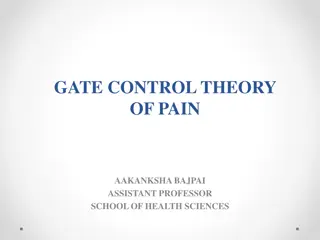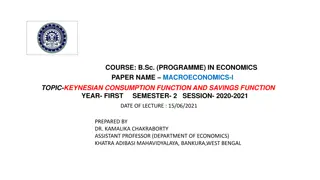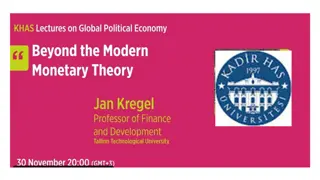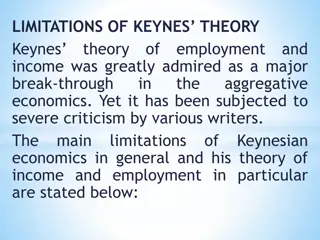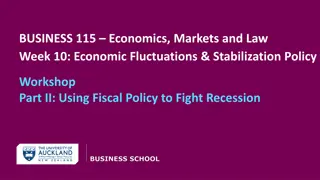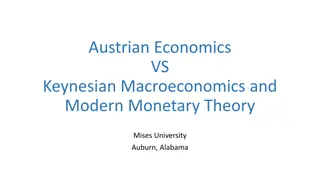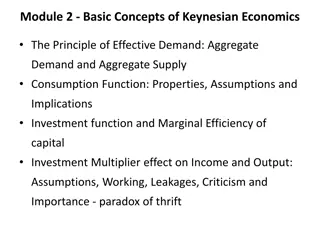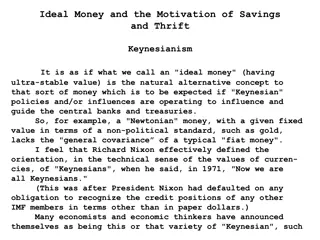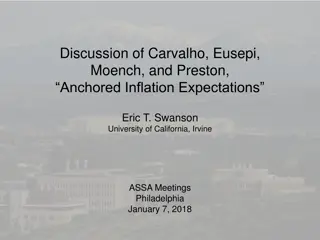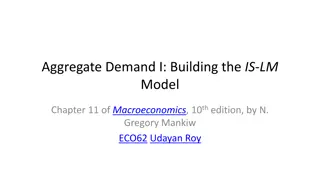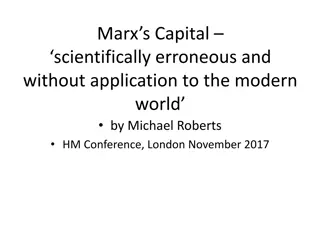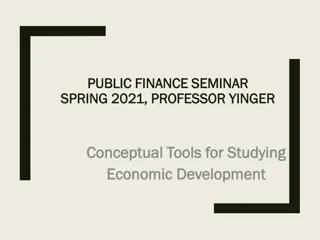Ginzburg Landau phenomenological Theory
The Ginzburg-Landau phenomenological theory explains superconductivity and superfluidity as distinct thermodynamic phases. It focuses on phase transitions characterized by singularities in specific heat at the transition temperature. Derived from BCS theory, it quantifies condensation energy, emphas
1 views • 38 slides
Crystal Field Theory in Transition Metal Complexes
Crystal Field Theory (CFT) explains the colors and magnetic properties of transition metal complexes. It focuses on the energy changes in d-orbitals of metal ions caused by surrounding ligands. This theory, developed in 1929, provides insights into the bonding interactions in complex compounds. The
10 views • 44 slides
Understanding Social Learning Theory and the Power of Example
Social Learning Theory, introduced by Bandura, emphasizes learning through observation and modeling. It explores how individuals acquire behavioral dispositions, trial-and-error experiences, and the impact of stimuli in the environment. The theory focuses on the importance of attention, retention, a
1 views • 17 slides
Evolution of Mathematical Theories and Proof Systems
Development of mathematical theories such as model theory, proof theory, set theory, recursion theory, and computational complexity is discussed, starting from historical perspectives with Dedekind and Peano to Godel's theorems, recursion theory's golden age in the 1930s, and advancements in proof t
1 views • 29 slides
Introduction to Organizational Behavior: Management Theories and Practices
Explore the evolution of organizational behavior from early management theories to contemporary practices. Understand the historical foundations and relevance of management theory in shaping workplace dynamics. Delve into key concepts like Scientific Management, Administrative Management, Bureaucrat
1 views • 28 slides
Understanding Fiscal Policy Options in Economics
Explore the evolution of economic theories including classical economics, demand-side economics, and supply-side economics. Learn about the impact of key figures like John Maynard Keynes and Milton Friedman on fiscal policy decisions and the U.S. economy. Delve into the strategies employed during th
0 views • 18 slides
Theories on the Origin of State: Divine, Force, Patriarchal, and More
Various theories such as Divine Origin, Force Theory, Patriarchal Theory, and others explain the origin of the state. Divine theories attribute state creation to God, while Force Theory emphasizes the strong subjugating the weak to establish authority. Each theory offers unique perspectives on the h
1 views • 24 slides
Understanding Forgetting: Theories and Influence on Memory Recall
Forgetting is a complex phenomenon influenced by theories such as Decay Theory, Interference Theory, and Motivated Forgetting. The Ebbinghaus forgetting curve highlights how memories fade over time. Decay Theory suggests memories decay over time, while Interference Theory explains how old and new me
0 views • 25 slides
Psychological Theories of Criminality: Understanding the Roots
Psychological theories of criminality delve into the association between intelligence, personality, learning, and criminal behavior. Major theories include Psychodynamic Theory by Freud, Behavioral Theory by Bandura, and Cognitive Theory by Kohlberg. These theories explore how unconscious mental pro
1 views • 20 slides
Austin's Theory of Law by Rinkey Sharma: An Overview
Austin's Theory of Law, presented by Rinkey Sharma, delves into the Imperative Theory of Law as proposed by Austin, known as the father of English jurisprudence. It explores General and Particular Jurisprudence, Austin's definition of law, and the elements of positive law, emphasizing the concepts o
0 views • 11 slides
Theories of International Relations Overview
The field of International Relations (IR) encompasses various theories that seek to explain global phenomena, drawing from disciplines like history, philosophy, and economics. Theory, derived from contemplation and speculation, organizes ideas to explain issues such as state emergence, conflict caus
1 views • 47 slides
Understanding the Gate Control Theory of Pain in Pain Management
This detailed content delves into the Gate Control Theory of Pain, explaining pain pathways involving nociceptors, A-delta fibers, and C fibers. It further explores central pain pathways like the spinothalamic tract, spinomesencephalic tract, and spinoreticular tract. The theory's mechanism of pain
3 views • 11 slides
Overview of Cooperative Game Theory and Bargaining Solutions
Cooperative game theory explores situations where players have mutual benefits in cooperating. The focus is on bargaining solutions to reach agreements despite conflicting interests. Key concepts include Nash Bargaining Solution, Kalai-Smorodinsky Bargaining Solution, and Rubinstein Bargaining Proce
1 views • 24 slides
Understanding the Theory of Firms: Neoclassical vs. Modern Approaches
The theory of firms is explored through the Neoclassical and Modern perspectives. Neoclassical theory focuses on profit maximization, while Modern theory delves into managerial, principal-agent, and transaction cost theories. The discussion covers criticisms of Neoclassical theory and the essential
1 views • 79 slides
Understanding Keynesian Consumption and Savings Functions in Macroeconomics
Keynesian consumption function details the relationship between total consumption and gross national income. It emphasizes the stability of aggregate consumption and the marginal propensity to consume. Similarly, Keynesian savings function illustrates the link between savings and national income, hi
0 views • 6 slides
Origin of Hedge Funds and MMT's Economic Principles
Hedge funds began with relative value sovereign bond trades, while Modern Monetary Theory (MMT) emphasizes government as the supplier of jobs for full employment. MMT challenges traditional economic norms, advocating for deficit spending and disregarding the need for balancing budgets. It integrates
0 views • 22 slides
Critique of Keynesian Economic Theory
Keynesian economic theory, though groundbreaking, faces several limitations. These include contradictions between equilibrium and unemployment, neglect of long-term analysis, assumptions of perfect competition and a closed economy, lack of generality, and a static rather than dynamic focus. Critics
0 views • 9 slides
Theories of Causation in Psychological and Social Sciences
Overview of theories of causation categorized into psychological, social psychological, and sociological perspectives. Psychological theories focus on instinctive, biological, and psychological qualities of abusers, including Attachment Theory, Psychodynamic Theory, Social Learning Theory, and Situa
0 views • 15 slides
Understanding Political Theory through a Contextual Approach
Exploring G.H. Sabine's perspective on political theory through a contextual approach, emphasizing the importance of historical context and societal influences. Sabine argues that while political theory evolves with its contemporary politics, it should be analyzed within its specific time and social
0 views • 9 slides
Understanding Fiscal Policy to Combat Recessions
Explore the role of fiscal policy in fighting recessions through stimulating aggregate demand, using government spending and tax cuts. Learn about the Keynesian multiplier effect, MPC, and different policy responses to economic fluctuations. Discover how government interventions can help stabilize t
0 views • 47 slides
Evolution of Light Theory: From Wave Theory to Quantum Theory
At the turn of the century, the discovery of the photoelectric effect challenged the wave theory of light, leading to the development of the quantum theory by Max Planck and Albert Einstein. This new theory introduced the concept of discrete energy units known as quanta, bridging the gap between wav
1 views • 62 slides
Contrasting Austrian Economics vs. Keynesian Macroeconomics
Austrian Economics emphasizes human action, voluntary saving, and analyzing the entire economic order, while Keynesian Macroeconomics views the economy as inherently unstable and focuses on factors like spending, investment, and interest rates to manage recession risks. The modern macroeconomics app
0 views • 15 slides
Understanding Keynesian Economics: Effective Demand and Aggregate Supply
Keynesian economics emphasizes the importance of effective demand in determining income, output, and employment levels. Effective demand, as outlined by Keynes, is the equilibrium level of demand that is met by aggregate supply to maintain stable employment and output levels. It is influenced by fac
0 views • 37 slides
Understanding Keynesian Consumption and Savings Functions in Macroeconomics
Keynesian Consumption Function relates total consumption to national income, with stable characteristics like MPC and APC. Savings Function shows the relationship between savings and income, highlighting the Marginal Propensity to Save and Average Propensity to Save. Both functions are essential con
0 views • 6 slides
Dp-branes, NS5-branes, U-duality, and M-Theory Overview
Overview of Dp-branes, NS5-branes, and U-duality derived from nonabelian (2,0) theory with Lie 3-algebra. Introduction to M-theory, including M2-branes and M5-branes in the strong coupling limit. Discussion on BLG theory, Lorentzian Lie 3-algebra, and the ABJM theory for M2-branes.
1 views • 32 slides
Understanding Time-Independent Perturbation Theory in Quantum Mechanics
Perturbation theory is a powerful tool in solving complex physical and mathematical problems approximately by adjusting solutions from a related problem with known solutions. This theory allows for more accurate approximate solutions by treating the difference as a small perturbation. An example inv
0 views • 19 slides
Exploring Ideal Money and Keynesianism in Economic Policies
Exploring the concept of "ideal money" in contrast to Keynesian influences on central banks and treasuries. The discussion touches upon the stability of currency values, Nixon's declaration of being Keynesian, and how Keynesianism is approached as a political movement seeking wealth redistribution f
0 views • 22 slides
Ethical Theories: Divine Command vs. Virtue Theory Explained
Divine Command Theory asserts that morality is derived from God's commands, contrasting with Virtue Theory which focuses on developing moral virtues to achieve human flourishing and excellence. Divine Command Theory relies on religious texts, while Virtue Theory emphasizes the cultivation of virtues
0 views • 24 slides
Understanding Endogenous Inflation Expectations in Macroeconomic Models
The paper discusses how inflation expectations were well anchored in the 2000s compared to the 1970s, exploring the factors that influenced this phenomenon. It introduces a model that includes endogenous inflation expectations and highlights the feedback, decreasing gain, and regime-switching featur
0 views • 18 slides
Understanding the IS-LM Model in Macroeconomics
This content delves into the IS-LM theory of static short-run macroeconomics, focusing on the goods market in the short run. It discusses the difference between real and nominal variables, recaps long-run macroeconomics, and explores the Keynesian Cross theory to understand short-run equilibrium. Ex
0 views • 74 slides
Understanding Fermi Liquid Theory in Interacting Fermion Systems
Fermi liquid theory, also known as Landau-Fermi liquid theory, is a theoretical model that describes the normal state of metals at low temperatures. Introduced by Landau and further developed by Abrikosov and Khalatnikov, this theory explains the similarities and differences between interacting ferm
0 views • 23 slides
Marx Versus Keynes: A Critical Examination of Economic Theories
Michael Roberts critiques Marx's Capital as scientifically erroneous and irrelevant to the modern world, contrasting it with Keynesian economics which questions the applicability of communist doctrine in contemporary society. The debate revolves around value theory, production, economic crises, and
0 views • 41 slides
Computational Learning Theory: An Overview
Computational Learning Theory explores inductive learning algorithms that generate hypotheses from training sets, emphasizing the uncertainty of generalization. The theory introduces probabilities to measure correctness and certainty, addressing challenges in learning hidden concepts. Through exampl
0 views • 43 slides
Automata Theory and Theory of Computation Overview
This course overview covers concepts in automata theory and theory of computation, including formal language classes, grammars, recognizers, theorems in automata theory, decidability, and intractability of computational problems. The Chomsky hierarchy, interplay between computing components, modern-
0 views • 42 slides
Theories of Interest in Microeconomics II
Explore various theories of interest in economics, including the Classical Theory, Liquidity Preference Theory by Keynes, Productivity Theory, Abstinence Theory, Time-Preference Theory, Fisher's Time Preference Theory, and the Loanable Fund Theory. These theories offer different perspectives on the
0 views • 6 slides
Understanding Fiscal Policy Issues and the Government Debt
Explore the causes of the Great Depression, differing views on fiscal policy, impacts of budget deficits on trade deficits, and key issues related to government debt. Learn about public debt concerns, effects of Social Security and Medicare programs, and debates on balanced budget amendments. Delve
0 views • 53 slides
Exploring the Evolution of Atomic Theory
Delve into the historical journey of atomic theory starting from Democritus and Aristotle's views to modern advancements proving some aspects of Dalton's theory incorrect. Learn about key laws and theories such as the Particle Theory of Matter, Dalton's Atomic Theory, and JJ Thomson's discoveries, s
0 views • 30 slides
Understanding Economic Development: Tools and Models for Analysis
Exploring conceptual tools for studying economic development, this seminar delves into key macroeconomic models such as Keynesian, export-base, and input-output models. The simplicity and implications of a Keynesian model, including the role of savings, consumption, investments, and trade, are discu
0 views • 42 slides
Understanding Monetary Policy: Mainstream vs. Monetarist Perspectives
Learn about the strengths and shortcomings of monetary policy, compare mainstream (Keynesian) and monetarist (Classical) views on macroeconomic instability, discuss self-correction in the economy, and explore the debate between rules and discretion in conducting stabilization policy. Key terms inclu
0 views • 52 slides
Macromechanical Analysis of Lamina and Tsai-Hill Failure Theory Overview
The Tsai-Hill failure theory is based on the strengths of a unidirectional lamina, incorporating longitudinal and transverse tensile and compressive strengths, as well as in-plane shear strength. This theory, derived from the distortion energy theory, provides criteria for determining lamina failure
0 views • 15 slides











